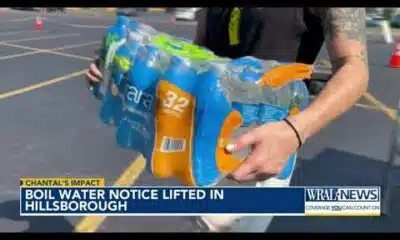Mississippi Today
Jackson leaders insist city water is safe to drink. Some mothers struggle to trust them.

As federal and city officials continue to work to assure residents the water flowing from the troubled Jackson system is safe to drink, distrust among many capital city residents — particularly mothers and caregivers of small children — runs deep.
Regular boil water notices, lack of consistent water pressure and concerns about the safety of drinking the water even when there is not an active boil water notice are commonplace in Mississippi’s largest city.
Multiple federal lawsuits about the city’s recent water quality are pending, and the U.S. Department of Justice last fall acknowledged several major water system problems, including an acknowledgment that the city had consistently not met federal safe water standards. And since 2016, the city has mailed residents quarterly warnings that pregnant women and small children, who are most susceptible to lead poisoning, should follow state and federal safety guidelines before drinking the water.
In recent days, Ted Henifin, the federal appointee to manage the city’s water system, argued that those city notices are no longer necessary after years of clean water tests. Jackson Mayor Chokwe Antar Lumumba has for months publicly repeated the refrain that the water is safe to drink.
In mid-June, while reiterating the water is safe to drink, Lumumba joined officials at the Jackson-Hinds Comprehensive Health Center to publicly announce a $100,000 donation to provide water filters specifically for pregnant women and with children under the age of 5.
Meanwhile, many caregivers across the city struggle to trust that the water flowing from the pipes is safe to give their loved ones.
“It’s hard in every way,” said Mary Rooks, a mother of four children under 10, who runs “JXN Motherhood,” an Instagram account that connects mothers across the capital city. “There are so many costs when your children are young … We pay a water bill, so you wouldn’t think you’d have to add an additional cost with water … There are so many factors of mom guilt. You just want to be the best parent of your child — bathing is a pretty simple necessity, and you’re like, ‘Can I bathe them in this water?’”
Rooks says that other parents, including parents of newborns, reached out to her during and after the 2022 Jackson water crisis, which left residents without safe tap water for weeks, to ask about how to handle various water concerns — many of which would likely not even occur to non-parents.
Even after the city-wide crisis passed, a friend with a newborn texted Rooks to ask if it was safe to wash baby bottles in the city’s water. She told them that she thought it should be fine, but the question was indicative of larger struggles parents of young children and babies have faced and continue to face.
“It’s nuts, all the implications that it has,” she said. “Anyone without children wouldn’t have a category for (the difficulties), which is fine — they haven’t been there. But washing bottles is taxing in and of itself, and then add I’m washing bottles with bottled water? It’s ridiculous.
“There’s a lot of responsibilities and hardships of parenthood, and then such a simple thing of water added to that makes it so much more complicated,” Rooks continued. “We pay for water, so it’s like one of those things where we feel like it’s a right as a citizen to have access to clean water, not only for ourselves, but for our families … It’s a simple thing, but when it’s taken away it’s a huge stress added on top of all the million ways you question yourself as a parent.”
‘The baby is extraordinarily susceptible’
During the August 2022 water crisis, some parents used unique methods to ensure their children had safe water to bathe in.
Maisie Brown started the MS Student Water Crisis Advocacy Team with more than 20 other students at Jackson State University, where she is now a rising senior. The organization — organized almost immediately after Gov. Tate Reeves announced that the city would be without clean, running water “indefinitely” — delivered bottled water to people’s homes.
Though Brown says that the majority of the calls she received were from elderly and/or disabled people, she estimates that roughly 30% of the calls were from mothers of young children. These mothers were hesitant to use the water for bathing or making formula for their babies, even after boiling it.
“You don’t want to put your baby in some water that might have bacteria or microbes in it,” Brown said. “(Adults) barely want to wash our hands with it.”
To help parents with bathing small children, some donation-based organizations like the MS Student Water Crisis Advocacy Team, asked people to donate not only bottled water, but also baby wipes and products like shower bags, which would allow people to freshen up without fully immersing themselves in contaminated water.
One week, Brown says her organization got a call from a disabled mother of several young children. When a volunteer arrived, she saw that the home was surrounded with buckets that were full of rainwater. The mother had been collecting the rainwater and, after boiling it, used it to bathe her children and flush toilets. She was more comfortable using boiled rainwater than she was using boiled water out of the faucet.

This mother’s continued concerns are not unique, as some parents fear that contaminants in the tap water will be absorbed through their child’s skin.
Dr. Christina Glick is a neonatologist who runs Mississippi Lactation Services, a free-standing breast-feeding clinic in Jackson. She estimates that about 70% to 80% of her clients live in the capital city. Glick says that breastfeeding is “the greatest protection against a crisis like this.”
The people who would be most negatively affected by drinking contaminated water are immunocompromised people and newborn babies. Even if a mother were to get sick from drinking the water herself, Glick says that breastfeeding filters the majority of contaminants out of the milk that babies drink.
Her major concern is for mothers who use formula to feed their babies.
“If the water isn’t clean, the baby is extraordinarily susceptible to even very small amounts of contaminants. It could make them very sick,” she said.
Globally, diarrhea is the second leading cause of death for children under the age of 5. According to the CDC, “about 88% of diarrhea-associated deaths are due to unsafe water, inadequate sanitation and insufficient hygiene.”
Despite breastfeeding being the safest option for those who are still concerned about the cleanliness of the water, it is not without issue, nor is it feasible for all parents and caregivers.
The water is ‘yucky’
Nakeitra Burse, owner of Six Dimensions, a public health research, development and practice agency, said that her major concerns with the water crises are how they impact breastfeeding mothers and people who are expecting.
Burse says that not having adequate access to clean, drinkable water could impact mothers’ milk supply. Dehydration can lead to reduced milk supply and to serious pregnancy complications. Water is essential for life at all stages, but it is especially vital when developing a new life, she said.
“For pregnant or postpartum mothers, (water) is really, really important to them being able to provide for their families, provide for their babies, provide for themselves and do whatever they need to produce the milk they need,” she said.
Because babies have such sensitive skin, Burse says she understands parents’ hesitation to use contaminated water for bathing. Not knowing what’s in the water could potentially have long term impacts for infants, she said.
Laurie Bertram Roberts is the executive director and co-founder of the Mississippi Reproductive Freedom Fund. She is also a mother, grandmother and Jacksonian. Her granddaughter, who is a toddler, has never taken a bath in the capital city’s water. She and her family filter her granddaughter’s bathing water through a device that removes lead.
Bertram Roberts says that many of the expectant people with whom she works are already hesitant to use the water in any capacity because “the water looks gross, it smells gross and who the heck wants to put that in their body when they’re carrying a baby to term?”
But, she says, concerns go beyond those for expectant people and young children. Caregivers, in general — those who are helping care for elderly or disabled people — also have reasons to be wary of the water, especially if they are dealing with ailments like bed sores that make them more susceptible to infection.
Her own daughters have eczema, a skin condition that affects nearly 20% of African-American people. According to a 2019 study, Black and Hispanic children are more likely to miss school due to eczema. Bertram Roberts says that her daughters are hesitant to bathe using Jackson’s water in fear of exacerbating their eczema.
For Rooks, it was difficult to explain to her children that they should be drinking water, but that not all water was safe to drink. She and her husband explained to the children that the water was “yucky” and not safe for bathing because the children might potentially get the water in their mouths, or drinking, which led to cognitive dissonance when the family traveled out of town.
“My 7-year-old, he was 5 and 6 at the time, he was pretty receptive,” she said. “But he did think it was weird. We were traveling and getting water out of the sink, and he was like, ‘Why can we drink this water, but we can’t drink the water at home?’”
One of her younger children struggled with the water messaging even more.
“He was utterly confused,” she said. ‘Like, ‘You always tell me to drink more water and now you’re telling me not to drink water?’”
‘Compound issues’ pile up
Though the citywide water crisis has ended, concerns about the long term viability of the city’s water, specifically for young children and expectant mothers, continue. MSDH has issued recommendations for such households including running tap water for one to two minutes before drinking or cooking, not using hot tap water for drinking or cooking and using only filtered or bottled water for baby formula.
But Bertram Roberts thinks that many people, including young children and expectant people, are “probably drinking it anyway because the public health messaging in this city has been inadequate.”
“I think about all of these compound issues because people a lot of time look at it from one issue, like it’s just the lead or it’s just bacteria,” Bertram Roberts said. “But it’s all of those risks and then it’s … with the compound issues of medical racism and lack of health care and issues with access to assistance programs and unemployment issues. All of these compound issues that build on top of, like, just this water issue that make it so much more of a risk and a crisis.”
She notes that many people were unaware about the potential for lead in the water until the lawsuit two years ago — despite the fact that MSDH had acknowledged potential lead concerns about five years prior. She’s also concerned that, though all people should be wary of lead exposure, most of the warnings are only for pregnant people or young children.
The CDC notes that “exposure to high levels of lead may cause anemia, weakness, and kidney and brain damage. Very high lead exposure can cause death.”

At a court status conference in June, Henifin, the city’s water system administrator, repeatedly said that the water is safe for everyone, including pregnant mothers and young children. If anything, he said, filters recently provided to pregnant and expecting mothers could make the water less safe if residents don’t change the filters out every four months, which could cause bacteria to build up.
Still, some don’t want to take any chances with their loved ones. Bertram Roberts says that many of the people with whom she works have only been told not to use the water for making formula, but not that their young children should also avoid drinking the water. Even when parents do know to keep their children from drinking the water, she says people should be cognizant of the added costs parents must incur to be able to do so.
“A lot of parents don’t let their kids drink Jackson water, but think of the expense that is to keep up bottled water for a family on SNAP, a big family. It’s expensive to keep up bottled water for thirsty kids,” she said.
Rooks’ family ultimately ended up installing a reverse osmosis device on their kitchen sink. The device is not a solution to ensuring the safety of water from other sources, like bathroom sinks or bathtub spouts, but it does help in making sure the children have access to at least one clean, safe water source. Rooks also recognizes that not everyone can afford to modify their drinking situation.
“Not everybody can do that,” she said. But it is providing comfort to her to know that her children are a bit safer. “Now they can just drink out of this one little spout. We’ve definitely adjusted, but I hate it’s an adjustment that we have to make.”
This article first appeared on Mississippi Today and is republished here under a Creative Commons license.
Mississippi Today
Rate decision on hold as Wingate tracks down Siemens funds
U.S. District Court Judge Henry Wingate said he’s putting his decision on hold over whether to approve JXN Water’s proposed rate increase until after he finds out what happened with roughly $90 million from a settlement with Siemens.
In 2020, the city of Jackson settled its lawsuit with the German company over years of faulty metering for water services. While about a third of the $90 million went to legal fees, city officials couldn’t immediately say where the rest of those funds went during a status conference Monday.
City Attorney Drew Martin said he was working to comply with a subpoena Wingate issued last week looking for an accounting of the settlement dollars, adding that he would have those details within a day or two. While he couldn’t say for sure where the money went, Martin said the city spent about $50 million within a few months after the settlement, and that there was $8 million remaining as of 2022.
Ted Henifin, who runs JXN Water and first proposed the rate increase in February, said the increase would still be necessary even if the utility received all the money from the Siemens settlement. He said the utility’s day-to-day management is operating at a deficit, and that the $60 million from the settlement — what Jackson received after paying its lawyers — would only cover losses for the next two years.
Henifin added that he’s asking the federal government to move around its funding to the city so he can spend more of it on operations and management. Without a boost to JXN Water’s finances, he said the utility would have to stop paying its contractors.
Wingate inquired about the settlement money during a two-day status conference last month. Henifin told the judge he had no idea what the city did with the funds. Wingate explained Monday that he wanted to make sure he was aware of all possible funding for JXN Water before approving a second rate increase in as many years.
It’s unclear how soon he’ll decide. In addition to Jackson officials, Wingate issued the subpoena on July 9 to the state and federal government as well as four different law firms. The subpoena gives the parties 30 days to produce any information on where the settlement funds went.
The judge also brought up the city’s history with shutting off nonpaying customers. Martin explained that the city, under then Mayor Tony Yarber, agreed to pause shutoffs for customers who had issues with Siemens’ water meters. Jackson prepared to bring back shutoffs in 2019, he said, but put them on hold again during the COVID-19 pandemic.
This article first appeared on Mississippi Today and is republished here under a Creative Commons Attribution-NoDerivatives 4.0 International License.
The post Rate decision on hold as Wingate tracks down Siemens funds appeared first on mississippitoday.org
Note: The following A.I. based commentary is not part of the original article, reproduced above, but is offered in the hopes that it will promote greater media literacy and critical thinking, by making any potential bias more visible to the reader –Staff Editor.
Political Bias Rating: Centrist
This article maintains a factual, neutral tone focused on reporting the status of a legal and financial issue concerning Jackson’s water utility and the Siemens settlement funds. It presents statements from both the judge and city officials without editorializing or taking sides. The language is straightforward and balanced, emphasizing transparency and accountability rather than ideological framing. The article refrains from promoting any political viewpoint and instead centers on the procedural and fiscal aspects of the case, aligning it with neutral, centrist reporting.
Mississippi Today
Donor aids Civil War battlefield in Vicksburg
Vicksburg National Military Park is receiving over $5 million toward restoring a key monument and removing a building that previously was used as a visitors’ center.
Friends of the Vicksburg National Military Park recently announced a $2.8 million private donation to the park by John L. Nau III, a Texas businessman and philanthropist who was a founding board member of the nonprofit Friends organization.
The National Park Service’s Centennial Challenge program will match the donation with $2.5 million in federal funds.
The money will go to restoring the Illinois Memorial and removing an unrelated building that was “erroneously constructed on core battlefield ground — an intrusion that obscures the story and sacrifices of the men who fought and died there in 1863,” according to the Friends.
“Standing on restored battlefield ground gives visitors a chance to truly understand the story of Vicksburg — not just read about it, but feel it,” Bess Averett, executive director of the Friends of Vicksburg National Military Park, said in a press release. “Visitors deserve to walk this hallowed ground and see it as Union and Confederate soldiers saw it during the siege.”
In 1863, Union forces led by Gen. Ulysses S. Grant laid siege to Vicksburg. After 47 days, the Confederate army surrendered, and the defeat turned the tide of the Civil War as the Union gained control of the Mississippi River.
Vicksburg National Military Park was established in 1899 at the battleground. It commemorates the siege and its role in the Civil War, as well as those who fought.
The Illinois Memorial is dedicated to more than 36,000 soldiers from that state who fought in Vicksburg. Both the stone and the inscriptions inside the building have worn down from weather exposure.
In the release, Friends of Vicksburg National Military Park said the park needs both public and private support, as the National Park Service manages over 400 units nationwide.
“We need donors and volunteers now more than ever before,” Averett said.
This article first appeared on Mississippi Today and is republished here under a Creative Commons Attribution-NoDerivatives 4.0 International License.
The post Donor aids Civil War battlefield in Vicksburg appeared first on mississippitoday.org
Note: The following A.I. based commentary is not part of the original article, reproduced above, but is offered in the hopes that it will promote greater media literacy and critical thinking, by making any potential bias more visible to the reader –Staff Editor.
Political Bias Rating: Centrist
This article presents factual reporting on a private donation to Vicksburg National Military Park without evident ideological slant. The piece focuses on the historical significance of the park, the restoration efforts funded by both private and federal sources, and quotes from a nonprofit executive emphasizing the need for support. The language is neutral and informative, avoiding political framing or partisan commentary. It reports on the actions and statements of involved parties without promoting a particular political viewpoint, adhering to balanced coverage of the subject matter.
Mississippi Today
Coast judge upholds secrecy in politically charged case. Media appeals ruling.
A Jackson County Chancery Court judge is denying the public access to a case that involves several politically connected Mississippians and their failed venture to ticket uninsured motorists using cameras and artificial intelligence.
Media companies Mississippi Today and the Sun Herald have filed for relief with the state Supreme Court, arguing that Chancery Judge Neil Harris improperly closed the court file without notice and a hearing to consider alternatives. The media outlets say the court file should be opened.
Mississippi Today in June filed its motion asking that Harris unseal the case, which he denied six days later.
Gulfport attorney Henry Laird writes in the media companies’ petition for state Supreme Court review, “The Chancery Court sealing the entire court file both before and after Mississippi Today’s motion to unseal the file violates the public and press’ cherished right of openness and access to its public court system and records.”
Mississippi judges have long followed a 1990 state Supreme Court decision that says, “A hearing must be held in which the press is allowed to intervene on behalf of the public and present argument, if any, against closure.”
Instead, Harris said he found no hearing necessary after reviewing the pleadings to open the file. The case, he said, is between two private companies.
“There are no public entities included as parties,” he wrote, “and there are no public funds at issue. Other than curiosity regarding issues between private parties, there is no public interest involved.”
The case involves what is usually a public function: Issuing tickets to the owners of uninsured vehicles. And, according to one party to the case, the Mississippi Department of Public Safety is owed $345,000 from the uninsured motorist program.
READ MORE: Private business ticketed uninsured Mississippi vehicle owners. Then the program blew up.
Since the entire court file is closed, the public is unable to see why the judge sealed the case. The Mississippians said in the Chancery Court case that they have “substantial” business interests to protect and “a lot of political importance,” an attorney opposing them said in a related federal case that is not sealed.
Georgia-based Securix LLC signed up its first Mississippi client in 2021, the city of Ocean Springs, an agreement with the city showed. Securix developed a program that uses traffic cameras, artificial intelligence and bulk data on insured motorists to identify the owners of vehicles without insurance.
To sign on other Mississippi cities, Securix enlisted three well-known consultants, Quinton Dickerson, Josh Gregory and Robert Wilkinson. Dickerson and Gregory are Republican political operatives in Jackson who have run numerous state and local campaigns and advise many of the state’s top elected officials. Wilkinson, a Coast attorney, has represented local governments and government agencies, including the city of Ocean Springs.
MS business partnership sours
In 2023, the Mississippians formed QJR LLC. Their company entered a 50-50 partnership with Securix called Securix Mississippi.
Securix Mississippi sold the cities of Biloxi, Pearl and Senatobia on the uninsured driver program.
Fees collected from uninsured drivers were apportioned to the company, the cities and the Department of Public Safety, the operating agreement with Biloxi showed.
The citations offered three options, according to copies included in a federal lawsuit filed by three Mississippi residents who received them:
- Call a toll-free number and provide proof of insurance.
- Enter a diversion program that charges a $300 fee and includes a short online course and requires agreement that the vehicle will not be driven uninsured on public roadways.
- Contest the ticket in court and risk $510 in fines and fees, plus the potential of a one-year driver’s license suspension.
The Securix Mississippi partnership soon soured.
Securix Chairman Jonathan Miller of Georgia said in a sworn court declaration submitted in the federal case that he was subjected around March 2024 to a “freeze out” by members and/or employees of QJR. They stopped giving him information, Miller said.
The Department of Public Safety in August pulled the plug on the controversial ticketing program, shutting off the company’s access to the insured driver database.
In September, QJR filed its Chancery Court lawsuit against Securix LLC.
What is known about the case comes from documents in the federal court file. QJR claims the company and its members have been defamed by Miller and Securix and wants their 50-50 business partnership dissolved.
The Chancery Court case does not even show up when the parties are searched for by name.
With a case number gleaned from the federal court file, a search of chancery records shows only that the case is under seal.
Normally, when a case is under seal, the docket would still be available. A docket lists all records and proceedings in a case. While sealed records are listed and described, they can’t be viewed.
“There is no court file,” attorney Laird said in asking the Supreme Court to review Judge Harris’ decision to leave the file sealed. “There is no docket sheet. There is absolutely no access on the part of the public or press to their public court file in this case.”
Judge closes file without public notice
All Mississippi court files are presumed open unless they are closed with notice and a hearing under guidelines established in the 1990 case Gannett River States Publishing Co. vs. Hand.
“It appears that the judge ignored what has been settled law in Mississippi since 1990,” said retired Jackson attorney Leonard Van Slyke, who represented Gannett in the case and still advises the media.
He added, “Since that time, there have not been many efforts to close a courtroom or a court file because the rules are pretty clear as to when that can be done. It is obvious from the rules that this would be a rare occurrence.”
A court file can be closed only if a party in the case requesting closure can show an “overriding interest” that would be prejudiced by publicity.
The Supreme Court said in 1990 that the public is entitled to at least 24 hours’ notice — on the court docket — before a judge considers closure. As a representative of the public, the media has a right to a hearing before a court file or proceeding is closed.
At the hearing, the judge must consider the least restrictive closure possible and reasonable alternatives. The judge also must make findings that explain why alternatives to closure were rejected.
The court wrote in Gannett vs. Hand:
“A transcript of the closure hearing should be made public and if a petition for extraordinary relief concerning a closure order is filed in this Court, it should be accompanied by the transcript, the court’s findings of fact and conclusions of law, and the evidence adduced at the hearing upon which the judge bases the findings and conclusions.”
Because Judge Harris held no hearing, the high court will have a scant record on which to base its review. Without a court record, Laird pointed out in his filing, the public can have no confidence the judge made a sound decision.
Kevin Goldberg, an attorney who serves as vice president and First Amendment expert at the nonpartisan, nonprofit Freedom Forum, said the First Amendment guarantees the public access to courts.
In the Securix case, he said, a private business was doing work normally performed by a police department or other public agency, and residents could be snared into legal proceedings when they received tickets and public funds were involved.
“These are not private people in a small town, going about their business,” Goldberg said. “These people’s business is the public’s business . . . I think that means they need to accept that they’re going to be scrutinized all the time, including when they voluntarily make a decision to go to court.”
This article was produced in partnership between the Sun Herald and Mississippi Today.
This article first appeared on Mississippi Today and is republished here under a Creative Commons Attribution-NoDerivatives 4.0 International License.
The post Coast judge upholds secrecy in politically charged case. Media appeals ruling. appeared first on mississippitoday.org
Note: The following A.I. based commentary is not part of the original article, reproduced above, but is offered in the hopes that it will promote greater media literacy and critical thinking, by making any potential bias more visible to the reader –Staff Editor.
Political Bias Rating: Center-Left
This article maintains a largely factual and investigative tone, focusing on government transparency, judicial procedure, and public access to court records. It critiques the secrecy upheld by a judge in a politically sensitive case involving private companies executing public functions, highlighting concerns about accountability and public interest. The framing leans slightly toward advocating for open government and media rights, values often associated with center-left perspectives. However, it stops short of overt ideological framing or partisan language, striving to report the facts and legal context while underscoring the public’s right to scrutiny.
-
News from the South - Tennessee News Feed2 days ago
Bread sold at Walmart, Kroger stores in TN, KY recalled over undeclared tree nut
-
News from the South - Missouri News Feed7 days ago
Leawood changes street tree ordinance, launches sidewalk repair program
-
News from the South - North Carolina News Feed6 days ago
Boil water notice lifted in Hillsborough
-
Mississippi Today5 days ago
Hospitals see danger in Medicaid spending cuts
-
News from the South - Arkansas News Feed7 days ago
Arkansas Department of Education creates searchable child care provider database
-
News from the South - Texas News Feed5 days ago
Why Kerr County balked on a new flood warning system
-
News from the South - Arkansas News Feed7 days ago
Arkansas National Guard deployed to Texas to assist in flooding response
-
News from the South - Texas News Feed6 days ago
Sheriff hints at ‘after action’ review, as records reveal warning of ‘worst-case flood event’





















































